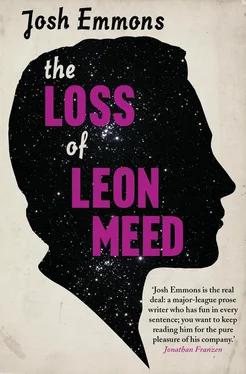“Oh, yeah,” said Giaccone, coughing the words.
“Yeah. This is what it’s all about, isn’t it?”
When Giaccone reached out to hold Elaine’s waist she caught his hand and pushed him back onto the desk, and as he got bigger she climbed up and sat on him and enfolded him.
“Oh, Jesus!” Giaccone cried out, stretching his hands over his head, pushing documents and the phone off the desk, writhing like a merman caught in a fishing net.
“You can’t bring him into it,” Elaine murmured. “He’s got nothing to do with it.”
When it was over she dressed while he lay staring at the ceiling.
“That was—” he said. “You hate me, don’t you?”
Elaine opened the door and said, “I don’t hate anybody,” closing it behind her. Down the hall she passed a wan twenty-something boy with thin blue hair wearing headphones and pushing a mop over scarred linoleum. He smiled at her and she smiled back, unable to gauge the innocence of the transaction, unable to gauge the innocence of anything. Outside, music was playing and she began to sing loudly, “I hear the human race/ Is falling on its face/ And hasn’t very far to go,/ But ev’ry whippoorwill/ Is selling me a bill/ And telling me it just ain’t so!”
“It just ain’t so,” she repeated to the trees and the cars and the houses and herself. “It could be awful and degrading and it could be a conspiracy of evil, but … but …” She let her voice fade to nothing and walked along as though carried by the wind, and when she remembered to look up through the breaks in the canopy of trees, the sky was a bright canary yellow.
Ten days later, at the corner of Broadway and Fifth Street, where Highway 101 hit the middle of its Eureka crawl, the night lights went off at the Pantry. It was seven thirty in the morning, and Silas Carlton had been drinking coffee and eating a Hungry Man Special for half an hour. He’d bought a Eureka Times-Standard on his way to the diner and read about the timber industry’s response to recent environmental activism. Both the article and the response were badly constructed; key elements of each contained errors.
Silas raised his coffee cup in salute to Teri as she walked by with orange-and-black-lidded coffeepots. He forgot which color meant decaffeinated and which meant regular, a distinction he’d known all his life. Like the names of friends and relatives that now escaped his immediate recall. Once familiar objects that had become strange. Orange meant something.
“Silas,” said Teri, pausing in her white sneakers and shadowy stockings, “I do declare I’ve never seen you ask for a third cup.”
“So you’ve turned into Scarlett O’Hara?” he said.
Teri smiled and refilled his cup and returned to the kitchen. The Times-Standard weighed in at twenty-four pages—depressingly small for the county’s largest newspaper. Silas read an article congratulating four county natives for running the Boston Marathon, although none had placed even in the top one thousand; an editorial explaining why the paper would discontinue its Public Safety Log, listing significant arrests (no longer had the space); and an Associated Press article about America’s zany love of meatless hot dogs. He skimmed local sports stories that had larger headlines than bodies, wedding announcements and syndicated comic strips and a company-profile “Who’s Who.”
He read more carefully when he got to the obituaries. These he appreciated. These were a chance for Silas, age seventy-five, to see what others were dying of and how and when and where. The details of death were increasingly interesting to him, and not just because it was less “later when I’m old” and more “any day now,” but because they seemed to come in two extreme varieties: the mundane and the horrific. Either “peacefully asleep in the arms of her husband of sixty years” or “shot in the head by a carjacker at the corner of H Street and Buhne,” provoking a “she was a fine lady” or “what the hell is wrong with this world?” Silas wondered how frequently there was a correlation between one’s death and one’s life, whether the old woman’s peaceful stroke ended a life of bone-deep righteousness or fantastic dissipation. And the carjack victim: choir boy or Hell’s Angel? Did karma play any part in our end? Was poetic justice mere poetry?
Silas’s life hadn’t been exemplary by certain standards, yet neither had it been unforgivable. There were things of which he was proud: raising his former wife’s diabetic son when she died and the boy’s father looked to be a slipshod guardian; refusing Shell Oil’s filthy lucre in exchange for his approval of their offshore oil drilling plan near Samoa; walking two miles in the middle of the night to a suicidal friend’s house and convincing her that depression, like happiness, was only temporary. As there was behavior of which he was ashamed: sleeping with his best friends’ wives (three best friends, five wives); knocking out a guy’s front teeth over a disputed game of pool; lying (to everyone, all the time, with and without reason). Silas wondered how, if at all, these things would affect his death.
He was a retired bike shop owner and former city councilman and often lonely. His outspoken criticisms of Eureka’s budgetary priorities and the state of America’s forests, which for many years had identified him in the community as someone who thought about big issues, now made him a curmudgeon.
He was tall and skinny and had bad posture from years of hunching over desks and trying not to be conspicuous around shorter people. Thick white hair shocked out of his head like a woodpecker’s, giving his bony features an avian quality. He wore sturdy black-framed glasses and black turtleneck sweaters like some funky old beatnik Rip Van Winkling in the twenty-first century doing his best Samuel Beckett impression and staring down the combined forces of illness, fatigue, and moral collapse. Yet nobody noticed him these days as he walked around Old Town and sat in coffee shops and listened and tried to eke out a meaning to his days. He blended into the background as someone you’d seen a thousand times but could never place from where. The social life now open to him centered on his niece Rebecca’s family—he’d once been close to his great-nieces Lillith and Maria—and chance encounters with people old enough to remember him. Very few occasions for him to forget names, altogether too few.
His death would make these people sad, and the other obituary readers out there would take note of it—perhaps like him they would speculate on its justice—and it would bring his family together for a day or two of discussing him fondly and resolving that life goes on. Silas’s sound and fury would be like the other sounds and furies that had signified nothing. He would disappear.
He looked across the diner at two mustachioed truck drivers—noted the grossly obtruding bellies over scrawny legs and the padded nylon vests and the feet that knew how to maintain 65 mph for several uninterrupted weeks—who hit each other lightly on the shoulder with the backs of their hands to emphasize a point or command a laugh-along. Touching someone makes them your friend. Silas recognized one of the men and miraculously remembered his name, Shannon Koslowski, whose father, Pete, had led the move to price-fix dairy products in the area thirty years earlier. Pete died two weeks ago. Aneurysm. Making an omelet.
Glancing down at the paper, Silas noticed a small box beneath the obituaries that said “MISSING: Leon Meed, of 427 Neeland Dr. Last seen on December 1. Age 54, medium height, curly brown hair. Any information, please call 555/2471.”
I’d rather go missing than die, Silas thought to himself. When you’re missing you still have a chance.
Читать дальше












